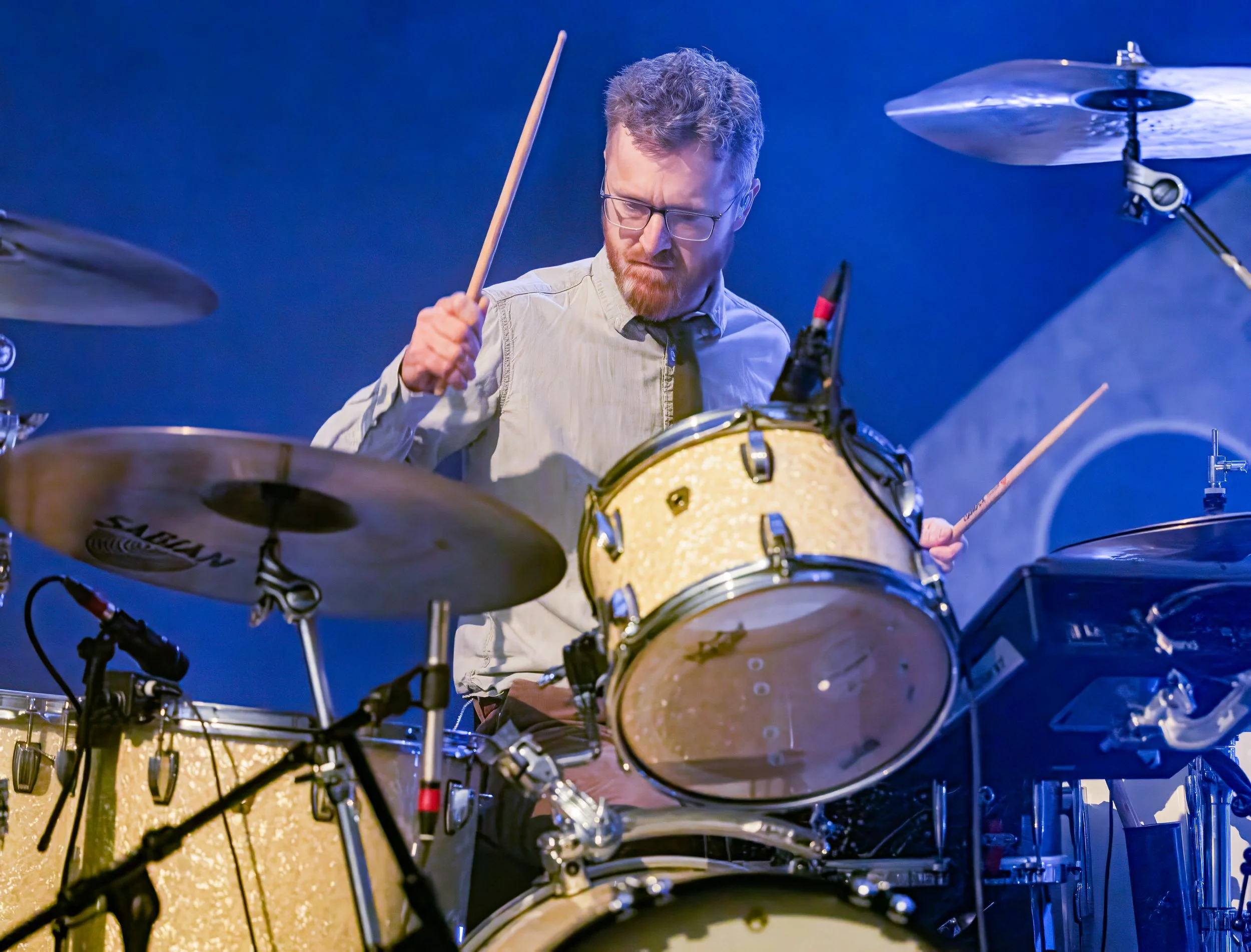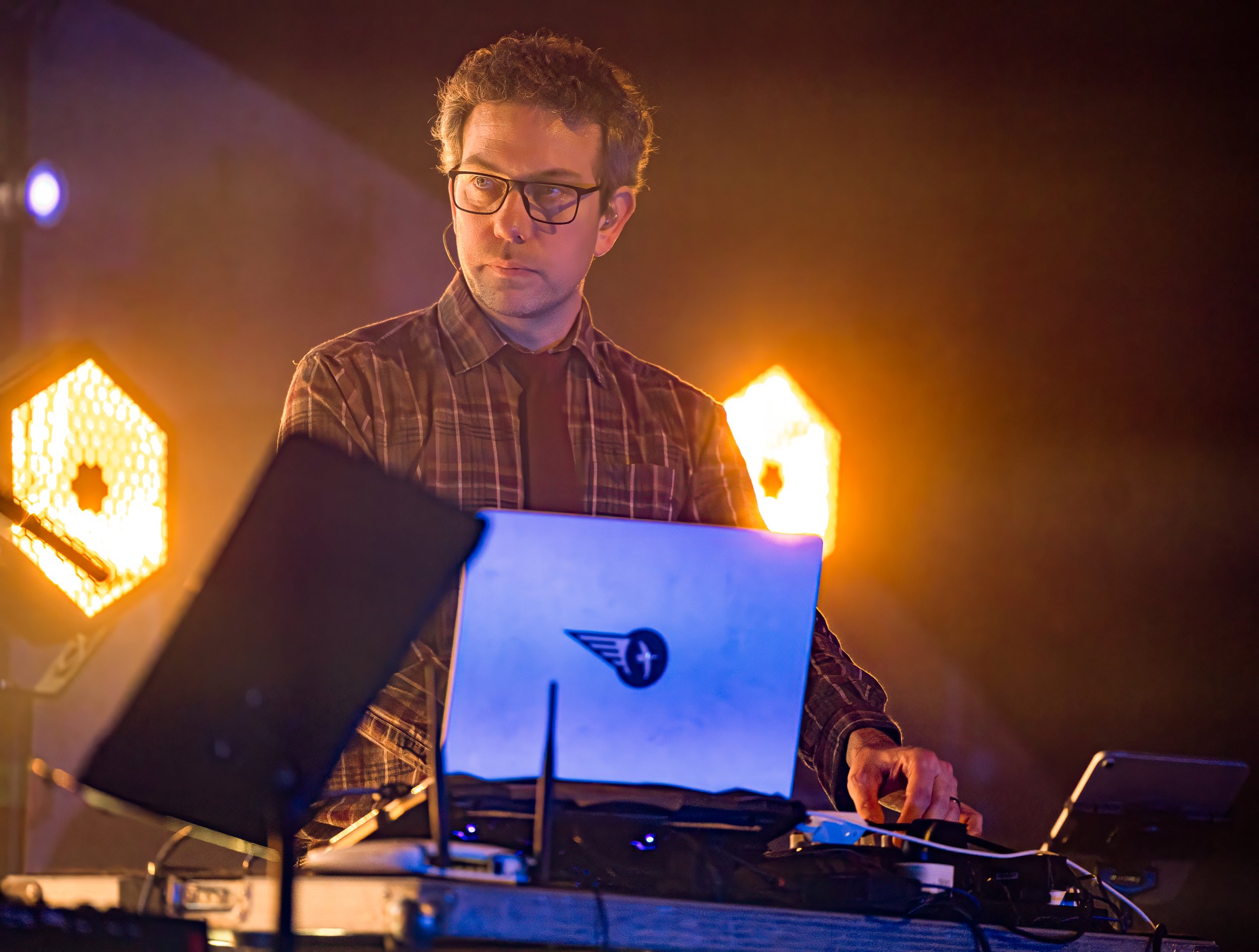PUBLIC SERVICE BROADCASTING // BARBICAN CENTRE, YORK
A False Start But We “Go...Go...Go” And Conquer “Everest” In The End
★★★★☆ (4/5)
PUBLIC SERVICE BROADCASTING PERFORMING AT YORK’S BARBICAN CENTRE
PHOTOCREDIT: JOHN HAYHURST
I’m back at the Barbican again, that’s three visits this year already, tonight it’s to catch Public Service Broadcasting, with support from She Drew The Gun.
The night commenced with She Drew The Gun taking the stage. Fronted by the charismatic Louisa Roach, the band delivered a set that was both politically charged and musically captivating. Their blend of psychedelic pop and incisive lyrics resonated deeply with the audience. Love it when Louisa will just quote her poetry in-between the songs like banter, it feels more art than rock performance and that fits in very well with the headline act. Tracks like "Mirrors" and "Panopticon" stood out, showcasing Roach's ability to intertwine storytelling with melody. The band's synergy was evident, and their performance set a high bar for the evening.
As the lights dimmed and the stage was prepared for the main act, the excitement in the venue intensified. We get a public service announcement regarding the use of mobile phones during the show (ok for a bit - but NOT all night) and no loud talking through the show too. Then something went bang and J. Willgoose, Esq. made a brief appearance only to restart two laptops that clearly were not doing what they should.
Public Service Broadcasting, known for their unique fusion of archival audio samples with live instrumentation, took to the stage a good five minutes late to enthusiastic but mildly annoyed applause.
The band's line-up features J. Willgoose, Esq. on guitar and electronics, Wrigglesworth on drums, JF Abraham handling multiple instruments including flugelhorn and bass, and Mr B covering visuals and set design enhancing the live experience. There is also a “guest” singer/keyboard player Anna Lena Bruland, aka EERA in the ranks and several brass players that appeared later.
The launch of "Electra" was delayed, but the driving rhythm and soaring melodies make for a stunning opening, and the cockpit controls at the back immediately transport the audience into the world of aviation history that the band’s latest album, "The Last Flight," explores.
"The Fun of It" followed, a track that encapsulates the thrill and joy of early flight. The interplay of vintage radio commentary with bright guitar work and pulsating synths created an infectious energy that had the crowd nodding along in unison.
One of the early unexpected delights of the set list was "People Will Always Need Coal" however the gremlins strike again and the track has to be restarted when Willgoose halts proceedings with a loud “No”. This track, from their album "Every Valley," takes us back to the industrial heartlands, showcasing the band's ability to transform public information films into deeply evocative pieces of music. The juxtaposition of optimistic archival narration with melancholic, brooding instrumentation adds layers of complexity to their performance. They are certainly doing something different than the usual trad band on stage, but obviously rely on so much technology that when the software or hardware fails there isn’t really a Plan b other than to start again. CTRL-ALT-DEL could be a suitable title for the next album.
"Progress," featuring EERA’s haunting vocals, was another highlight. The song’s robotic, almost hypnotic beats echoed themes of technological advancement and automation, offering a sharp contrast to the nostalgic warmth of the previous track.
"Night Mail" was another standout moment, taking us back to the golden age of British documentary film-making. The rhythmic delivery of W.H. Auden’s poetic narration, paired with the chugging, percussive beat, felt timeless—an ode to both history and modernity.
The middle of the set brought "The South Atlantic" and "Arabian Flight," two tracks that highlighted the band’s skill in crafting atmospheric, transportive soundscapes. The former carried a sense of foreboding, while the latter felt expansive, capturing the essence of airborne adventure.
As they had started late they had to cut “If War Should Come” from the set, and of course, no Public Service Broadcasting set would be complete without "Spitfire," and when the unmistakable opening riff rang out, the crowd mildly erupted. The energy in the room picked up as the song’s dynamic shifts mimicked the agile, daring movements of the aircraft it celebrates.
"Go!" provided another burst of energy with its driving beat and celebratory tone, celebrating the Apollo 11 moon landing with a danceable groove that had everyone moving.
The encore was nothing short of spectacular. "Gagarin," with its funky brass section and undeniable groove, turned the Barbican into a full-on dance party. There were spacemen on stage which turned out to be support band She Drew The Gun all dressed up.
Finally, the night concluded with "Everest," a fittingly grand finale. As the final notes rang out, accompanied by the famous quote, "Why should a man climb Everest? “Because it is there" the audience repeated and then it all came to a poignant and powerful close.
False starts aside, I couldn’t help but marvel at the way Public Service Broadcasting continue to push the boundaries of live performance. Their ability to seamlessly weave history, music, and visual storytelling into an experience that is both educational and profoundly moving is unmatched. Long may they continue.




















